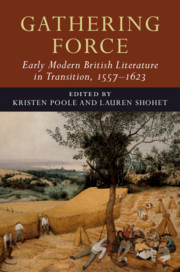Book contents
- Gathering Force: Early Modern British Literature in Transition, 1557-1623
- Early Modern British Literature in Transition, 1557–1714
- Gathering Force: Early Modern British Literature in Transition, 1557–1623
- Copyright page
- Dedication
- Contents
- Illustrations
- Contributors
- Acknowledgements
- Abbreviations
- Introduction
- Part I Generic Transitions
- Part II Literature and Ideological Transformation
- Part III Literature and Cultural Transformation
- Part IV Literature and Local Transformation
- Index
- References
Part III - Literature and Cultural Transformation
Published online by Cambridge University Press: 12 January 2019
- Gathering Force: Early Modern British Literature in Transition, 1557-1623
- Early Modern British Literature in Transition, 1557–1714
- Gathering Force: Early Modern British Literature in Transition, 1557–1623
- Copyright page
- Dedication
- Contents
- Illustrations
- Contributors
- Acknowledgements
- Abbreviations
- Introduction
- Part I Generic Transitions
- Part II Literature and Ideological Transformation
- Part III Literature and Cultural Transformation
- Part IV Literature and Local Transformation
- Index
- References
- Type
- Chapter
- Information
- Publisher: Cambridge University PressPrint publication year: 2019

